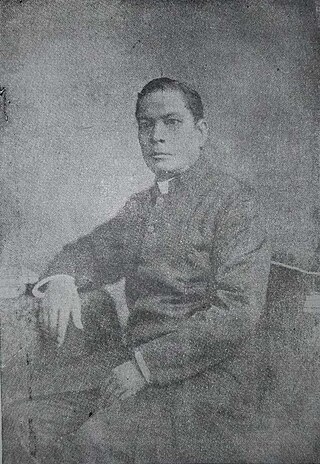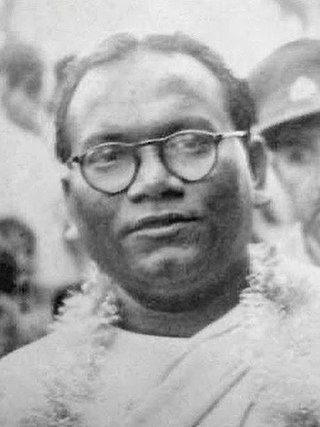Related Research Articles

Chandala is a Sanskrit word for someone who deals with the disposal of corpses, and is a Hindu lower caste, traditionally considered to be untouchable.
Namasudra, earlier known as Chandal, is an Avarna Bengali Hindu community originating from eastern and central Bengal. The term Chandal or Chandala is usually considered as a slur. They were traditionally engaged in fishing and as boatmen, and later in cultivation. They lived outside the four-tier ritual varna system and thus were outcastes.

Basanta Kumar Biswas was an Indian pro-independence activist involved in the Jugantar group who, in December 1912, played a role in the bombing of the Viceroy's parade in what came to be known as the Delhi-Lahore Conspiracy.

Reverend Lal Behari Day was an Indian writer and journalist, who converted to Christianity, and became a Christian missionary himself.
Jugantar or Yugantar was one of the two main secret revolutionary trends operating in Bengal for Indian independence. This association, like Anushilan Samiti, started in the guise of a suburban health and fitness club while secretly nurturing revolutionaries. Several Jugantar members were arrested, hanged, or deported for life to the Cellular Jail in Andaman and many of them joined the Communist Consolidation in the Cellular Jail.

Jogendranath Mandal emerged as a prominent figure among the architects of the nascent state of Pakistan. He served as the inaugural Minister of Law and Labour, as well as the subsequent Minister of Commonwealth and Kashmir Affairs. Within the Interim Government of India, he had previously held the portfolio of law. Distinguished as a leader representing the Scheduled Castes (Dalits), Mandal vehemently opposed the partition of Bengal in 1947. His rationale rested on the apprehension that a divided Bengal would subject the Dalits to the dominance of the majority caste-Hindus in West Bengal (India) and Assam. Eventually opting to maintain his base in East Pakistan, Mandal aspired for the welfare of the Dalits and assumed a ministerial role in Pakistan as the Minister of Law and Labour. However, a few years subsequent to the partition, he relocated to India, tendering his resignation to Liaquat Ali Khan, the then Prime Minister of Pakistan, citing the perceived anti-Dalit bias within the Pakistani administration.
Mahishya is a Bengali Hindu traditionally agrarian caste, and formed the largest caste in undivided Bengal. Mahisyas were, and still are, extremely diverse caste consisting of all possible classes in terms of material conditions and ranks.
Biswas is a native Bengali surname, commonly used by the Bengali community of India and Bangladesh. The surname was an honorary title bestowed on persons who were relied upon for the work of accounts, receipts and expenditure. The word Biswas means faith or trust in Bengali.

Rao Bahadur Namasivayam Sivaraj was an Indian lawyer, politician and Scheduled Caste activist from the state of Tamil Nadu.
Harichand Thakur, was a social reformer worked among the untouchable people of Bengal Presidency. He formed the Matua sect of Hindus.

The Matua Mahasangha is a Hindu reform movement that originated around 1860 AD in modern-day Bangladesh. Today, it has a considerable number of adherents both in Bangladesh and in West Bengal, India.
Suvarna Banik, also called Bene, is a Bengali mercantile caste dealing in gold and silver. During the late 18th century, merchants of the caste became prominent in trade. In spite of their inferior ritual rank, they were the most well known trading caste in Bengal region as per the 1951 Census of India.
Baniapukur Ballygung Assembly constituency was a Legislative Assembly constituency of Kolkata district in the Indian state of West Bengal.

Pramatha Ranjan Thakur was an Indian politician elected as a member of the West Bengal Legislative Assembly from the Hanskhali constituency in the 1962 elections as a candidate of the Indian National Congress. The seat was reserved for candidates from the Scheduled Castes.

Ram Ratan Ram (1921–2002) was an Indian politician. He was a Member of Parliament and former General Secretary, Indian National Congress. He served as social worker and advocate, under the mentorship of Bose. He was elected to the Bihar Vidhan Sabha in 1952 and won every consecutive election till his move to the centre in 1984. Ram was elected to the Lok Sabha, the lower house of the Parliament of India from Hajipur in Bihar as a member of the Indian National Congress.
Birat Chandra Mandal was a member of the 1st National Assembly of Pakistan as a representative of East Pakistan. He had argued for the constitution of Pakistan to be secular.

Kanti Biswas, was an Indian communist politician and former minister from West Bengal.
Guruchand Thakur (1846-1937) was an Indian reformer who works for the upliftment of the untouchable peoples in the Indian society. He leads the Matua sect of Hindus after the death of his father Harichand Thakur. Under his strong leadership, the Matua section achieved a major organizational push and started the Namasudra protest movement in 1872. He established many schools for the upliftment of the Dalit community. He preached the abolition of caste inequality, gender equality via performing secular duties. Matua Movement is one of the first Dalit uprisings in the Indian subcontinent.
Orakandi Thakur Bari is a pilgrimage for Matua Community in Bangladesh. It is popularly known for the birthplace of Sri Sri Harichand Thakur, founder of the Matua Community and his son Sri Sri Guruchand Thakur, a social reformer. Matua Movement, a reforming movement for the upliftment of backward community started in about 1860. The place comes to the limelight after Indian Prime Minister Narendra Modi visited here in 28 March 2021.
References
- ↑ "Bengal Depressed Classes Association - Banglapedia". en.banglapedia.org. Retrieved 6 October 2020.
- ↑ Pioneer, The. "Namasudras of Bengal and impact on nation's freedom movement". The Pioneer. Retrieved 6 October 2020.
- ↑ Hashmi, Taj Ul-islam (11 July 2019). Pakistan As A Peasant Utopia: The Communalization Of Class Politics In East Bengal, 1920-1947. Routledge. ISBN 978-1-000-31037-5.
- ↑ Biswas, Saugat K. (2008). Nine Decades of Marxism in the Land of Brahminism. Other Books. ISBN 978-81-906019-3-1.
- ↑ विस्वास, A. K. Biswas एके (20 November 2016). "How the Bengali chotalok shaped India's destiny". Forward Press. Retrieved 6 October 2020.
- ↑ Roy, Anwesha (3 May 2018). Making Peace, Making Riots. Cambridge University Press. ISBN 978-1-108-42828-6.